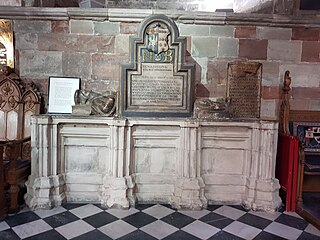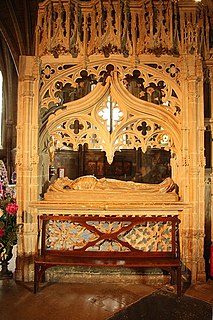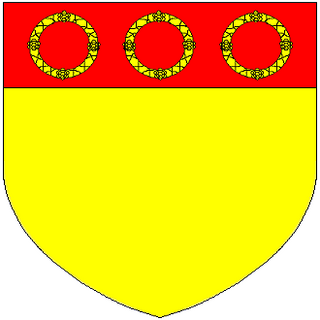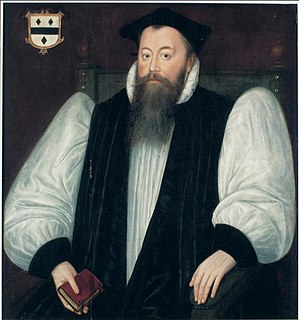Related Research Articles

William Paget, 1st Baron Paget of Beaudesert, was an English statesman and accountant who held prominent positions in the service of Henry VIII, Edward VI and Mary I.
Elstree is a large village in the Hertsmere borough of Hertfordshire, England. It is about 15 miles northwest of central London on the former A5 road, that follows the course of Watling Street. In 2011, its population was 5,110. It forms part of the civil parish of Elstree and Borehamwood, originally known simply as Elstree.

Nicholas Bullingham was an English Bishop of Worcester.

John Rainolds was an English academic and churchman, of Puritan views. He is remembered for his role in the Authorized Version of the Bible, a project of which he was initiator.
The title of Earl Marischal was created in the Peerage of Scotland for William Keith, the Great Marischal of Scotland.

St Mary Hall was a medieval academic hall of the University of Oxford. It was associated with Oriel College from 1326 to 1545, but functioned independently from 1545 until it was incorporated into Oriel College in 1902.
Bishop Rowland Lee was an English clergyman who served as Bishop of Coventry and Lichfield 1534–43 and also as Lord President of the Marches under King Henry VIII.

Thomas Edward Ellis, often known as T. E. Ellis or Tom Ellis, was a Welsh politician who was the leader of Cymru Fydd, a movement aimed at gaining home rule for Wales. Ellis was, for a time, the most prominent of a generation of Liberal politicians who emerged in Wales after 1886, who placed greater emphasis than the previous generation to a Welsh dimension to their politics. His early death in 1899 aged 40 added to the aura that surrounded his name.

John Wakeman was an English Benedictine, the last Abbot of Tewkesbury and first Bishop of Gloucester, both posts in the English county of Gloucestershire. In the earlier part of his life he went by the name John Wiche.
The Stanhope essay prize was an undergraduate history essay prize created at Balliol College, Oxford, by Philip Henry Stanhope, 5th Earl Stanhope in 1855.

Sir John Thynne was the steward to Edward Seymour, 1st Duke of Somerset and a member of parliament. He was the builder of Longleat House and his descendants became Marquesses of Bath.

Sir Richard Morrison was an English humanist scholar and diplomat. He was a protégé of Thomas Cromwell, propagandist for Henry VIII, and then ambassador to the German court of Charles V for Edward VI.

Henry Parry (1561–1616) was an English bishop.
Philip Schwyzer is an American-British literary scholar and author, who since 2001 has been Professor of Renaissance Literature at Exeter University.
Events from the year 1743 in Wales.
This article is about the particular significance of the year 1723 to Wales and its people.
Sir William Cornwallis of Brome was an English courtier and politician.

William Arthur Shaw (1865–1943) was an English historian and archivist.

The Cambrian Quarterly Magazine and Celtic Repertory was an English-language quarterly magazine that published articles on Welsh and Celtic history and literature. Its aims were "to preserve 'native lore' for posterity and to win 'the incurious and indifferent into an interest for Wales'." It ran from 1829 to 1833.
References
- Philip Schwyzer, 'Kelton, Arthur (d. 1549/50)’, Oxford Dictionary of National Biography, Oxford University Press, 2004 retrieved 16 April 2007 (subscription access)
- W. O. Ringler, 'Arthur Kelton's contributions to early British history', Huntington Library Quarterly, 40 (1976–7), 353–6.